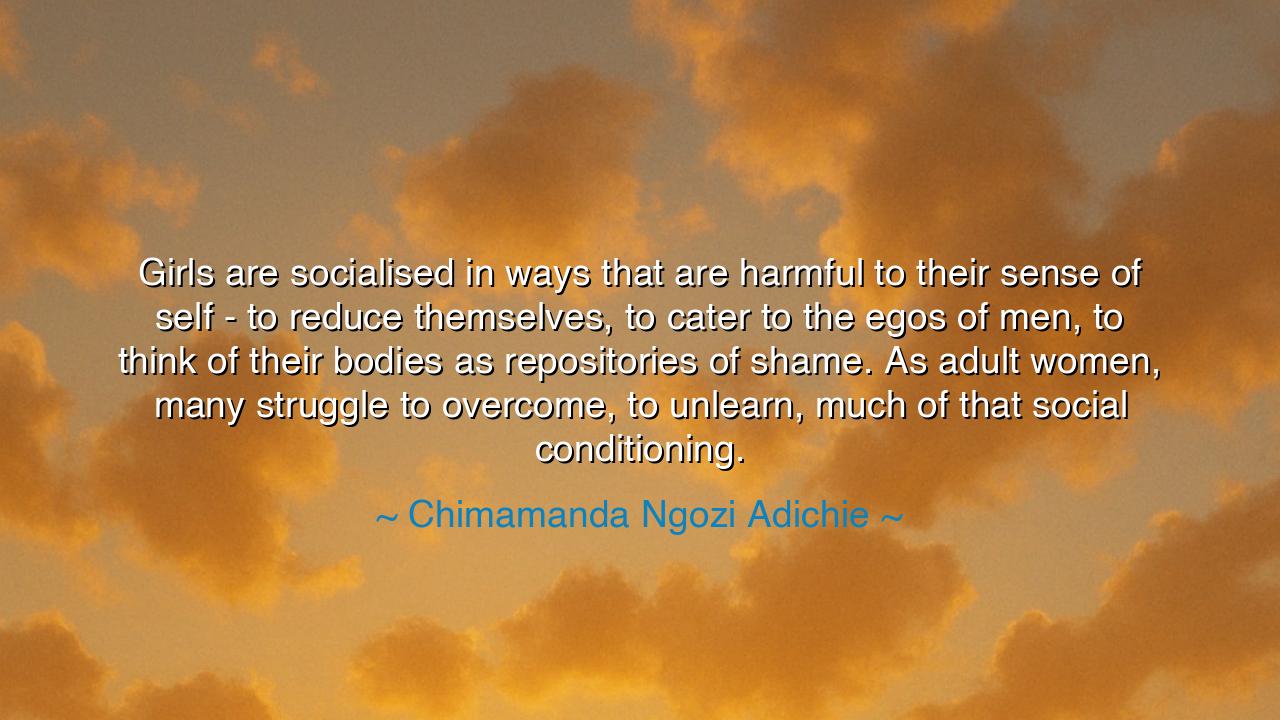
Girls are socialised in ways that are harmful to their sense of
Girls are socialised in ways that are harmful to their sense of self - to reduce themselves, to cater to the egos of men, to think of their bodies as repositories of shame. As adult women, many struggle to overcome, to unlearn, much of that social conditioning.






In the deep currents of human history, there lies a truth that has shaped the lives of countless women across generations: the conditioning that molds the very essence of their being. Chimamanda Ngozi Adichie, in her powerful words, sheds light on this painful reality: “Girls are socialised in ways that are harmful to their sense of self—to reduce themselves, to cater to the egos of men, to think of their bodies as repositories of shame.” This truth resonates not only in the modern world but throughout the ages, for women have long been taught to diminish their own worth, to bend to the will of others, and to carry the weight of societal expectations that have nothing to do with their true nature.
From the very dawn of civilization, societies have imposed upon women the roles they must play, often limiting their voices, their desires, and their autonomy. In ancient times, the Greek philosophers, though brilliant in their search for wisdom, often held that a woman’s place was in the home, subservient to the will of men. Homer’s Iliad and Odyssey, though filled with powerful female figures such as Penelope and Helen, still bound them within the confines of patriarchal expectations, their worth often measured by their beauty or their ability to serve men’s needs. Even the great goddesses of myth, like Athena and Artemis, though powerful and revered, were often depicted through the lens of male desire or protection, reinforcing the idea that a woman’s strength was tied to the needs of others.
This conditioning, which begins in girlhood, is a poison that seeps into the very soul. Adichie reminds us that these ingrained beliefs cause harm to a girl’s sense of self, reducing her to something less than she is—something to be consumed, measured, and controlled. She is told that her value lies not in her individuality, not in her power, but in her ability to cater to the needs and desires of others. To be a woman in this world is, often, to feel shame for simply existing in her body, for her body is not her own, but an object that must be managed, hidden, or adorned for the gaze of others.
Consider the story of Sappho, the ancient poetess of Lesbos, whose lyrical verses have transcended time. Though she was lauded for her beauty and poetic gifts, she was also bound by the expectations of the ancient world, where the gaze of men determined the value of her work. In a world where women were often seen as vessels of beauty or objects to be adored, Sappho’s poetry, though powerful, was often reduced to the love and desire she evoked in others. This same pattern continues through the centuries, from the Renaissance to the modern age. Women, like Virginia Woolf and Sylvia Plath, were often forced to navigate a world where their self-worth was shaped by a patriarchal society that sought to diminish their agency.
This process of unlearning the shackles of societal conditioning is not easy. It is a struggle, a battle for one's identity, one's voice, and one’s power. Adichie speaks of the many adult women who, having grown, must now attempt to overcome the heavy burdens placed upon them in their youth. They must fight against a lifetime of messages that told them they were not enough unless they fit within prescribed roles. It is a fight for the freedom to exist as they are, to claim ownership of their bodies, their minds, and their voices.
One of the greatest heroes in this fight is Malala Yousafzai, a young girl from Pakistan who defied a world that sought to silence her. Malala, much like Adichie, spoke out for the right of girls to be educated, to be free from the chains of societal expectations that said they should be confined to the home. Malala’s courage to stand up to those who sought to silence her, to deny her the education and freedom she deserved, is a living testament to the battle many women face in breaking the chains of social conditioning.
The lesson we must take from Adichie’s words is one of empowerment. We, as individuals and as a society, must recognize the harmful conditioning that women face and strive to unlearn the messages that bind them. Women must be given the space to define themselves, to embrace their full potential without the weight of societal shame or expectation. And we, as a collective, must stop seeing women as vessels for others’ desires and instead recognize them as whole beings whose worth is not tied to their beauty, their service, or their submission.
Therefore, let us move forward with the knowledge that this struggle, though arduous, is necessary. Just as the ancients looked to their heroines and heroes for wisdom, so must we look to the women of today to find our own lessons in strength, resilience, and freedom. Let us give women the opportunity to unlearn the chains placed upon them and teach them to embrace their true selves. And as we do so, we will create a world where both men and women can walk freely, side by side, whole, empowered, and unshackled from the weight of past generations’ expectations.






AAdministratorAdministrator
Welcome, honored guests. Please leave a comment, we will respond soon